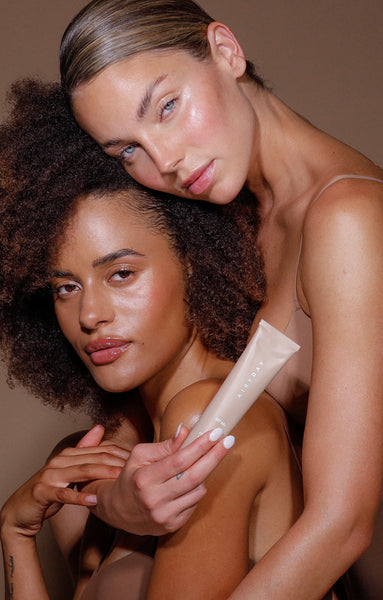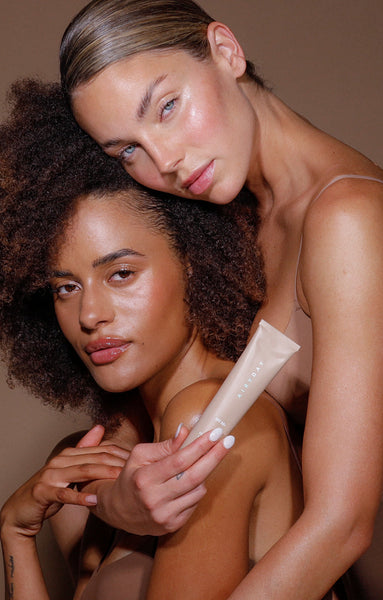WHAT DOES SPF MEAN?
We all know that sunscreen is the best anti-ageing investment you can make for your skin. We too love our 9-step routine filled with the creme de la creme of lotions and potions that promise to banish fine lines and pigmentation, but without sunscreen, its all pointless.
That once forgotten step in your routine, is actually your most important. By adding that extra layer to your routine, not only are you maintaining the integrity of every product you put underneath, but it’s proven to protect from premature ageing and higher risks of skin cancer.
Defining SPF
However, before we jump into how it all works, we need to first understand a little about those pesky UV rays, as of course, all sunscreen is designed with these in mind.
UVB rays affect your skin surface and cause sunburn – think B for burn.
UVA rays penetrate the deeper layers of the skin – destroying everything in their path. They alter the DNA contributing to premature ageing – think A for ageing.
Whilst UVA is known to be the main cause of skin cancer, together they cause skin cells to be abnormal and put you at a higher risk of skin cancers.
Sunscreens that protect against both UVA and UVB rays are labelled as ‘Broad Spectrum’ protection and are strongly recommended as the best protection for your skin i.e. protecting you from premature ageing, burning and higher risk of skin cancer.
Now, lets jump back into the world of SPF.
The term SPF, or Sun Protection Factor is the measure of how well your sunscreen protects your skin from sunburn. It is usually followed by a number and even a + sign to dictate the amount protection against UVB radiation that potentially reaches your skin, if it’s been applied correctly
SPF4-10 is low protection.
SPF15-25 is medium protection.
SPF30-50 is high protection.
SPF50+ is very high protection.
The rating (15, 30 or 50 and etc) indicates the amount of UVB radiation that potentially reaches your skin, if it’s been applied correctly. For example, an SPF30 is estimated to filter 96.7% of UVB radiation with 1/30th (3.3%) of UV reaching the skin, whilst a SPF50 is estimated to filter 98% of UVB radiation with 1/50th (2%) reaching the skin.
In Australia, all primary sunscreens (sunscreens with a core function to protect from the sun) are tested and abide by both the TGA and EU SCCS, which are the strictest regulators when it comes to sun safety and ingredient safety. Sunscreens must follow rigours testing when it comes to raw materials, supply chains and ultimately protection.
Is a higher SPF rating always better?
As a general rule, if you know you’ll be outdoors or sitting near a window that’s exposed to sun, of for the highest SPF ratings with broad spectrum protection and reapply every 2 hours.
SPF best practice
We recommend following the instructions on the tube and applying at least ½ teaspoon for face, neck, chest and 1 teaspoon per limb 20 minutes before heading into the sun.
As UV cannot be seen or felt, we need to look at the UV index to see how strong it is before we seize the day. Sunscreen is recommended on says where UV index is 3 and higher – this can be on those warm sunny days or ever cooler cloudy days.
Most people apply too-little sunscreen; either they don’t know how much to use, or they are using a product that has SPF built in, its never enough and causes patchy protection. Plus, don’t forget to reapply after 2 hours or 40 minutes if you’ve been swimming or heavily exercising.
Now, let’s find a formula and finish you’ll love.
Choosing the perfect facial sunscreen means considering factors like your skin type, concerns or the finish you prefer. Whether your skin is oily, dry, combination, or sensitive, we've curated a sunscreen that's perfect for you. Let’s break it down for you!
Clear as Day SPF50+: Perfect for dry, dehydrated and normal skins wanting a boost of hydration, she offers a dewy-satin and completely clear finish to the skin (chemical sunscreen).
Golden Glow SPF50+: Ideal for all skin types, including oilier complexions, she offers a light reflecting and golden luminosity for a satin touchable finish (chemical sunscreen).
Pretty in Zinc SPF50+: For sensitive and acne prone skins needs a little dose of Zen, she is a hydrating cream that feels breathable, leaving a second-skin finish with a subtle blur effect. Fragrance free. (physical sunscreen).
Mineral Mousse SPF50+: Perfect for an oilier complexion, her whipped texture that feels barely there, with a velvet matte finish and a slight blur effect. Fragrance free. (physical sunscreen).
All our sunscreens are supercharged with skincare goodness like Hyaluronic Acid, Vitamins C, E, F, Blue Light Protection, Niacinamide, Vegan Collagen and Blue Light Protection to ensure you’re protected inside-out. Plus, all our sunscreens can be used as a primer before make-up, are 40 minutes water resistant and perfect for daily use.











